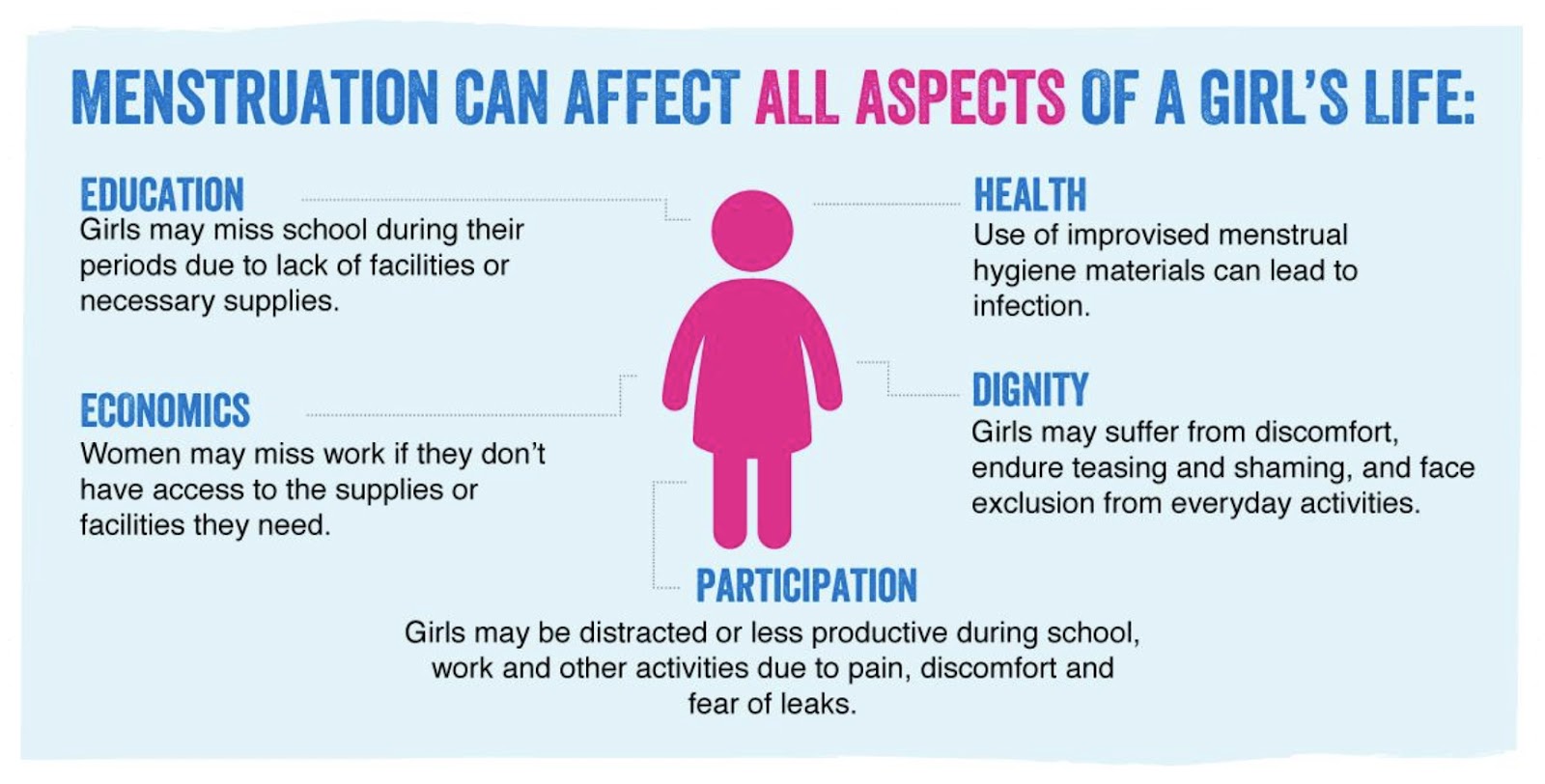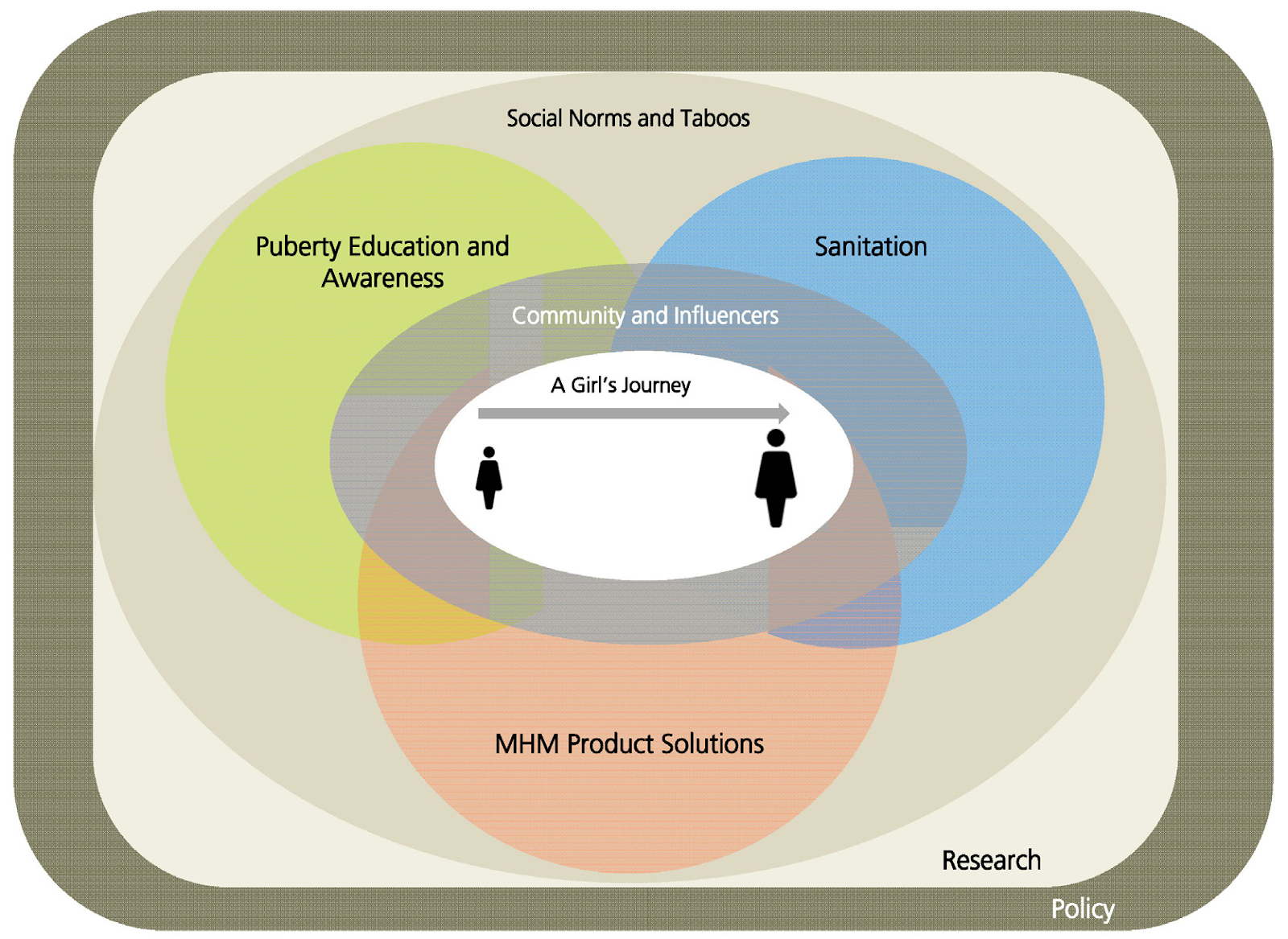I have been involved in several exciting projects over the past few weeks. Here are details on a couple of them.
Menstrual Health
Firstly, my supervisor and I proposed a menstrual health management (MHM) project to the Country Office, which was such an interesting and thought-provoking concept note to write. I thought I knew a fair amount about menstrual health issues and their impact on girls’ education, but as I was researching for the proposal I learned much more about the need to promote holistic programs that address MHM at all levels of society and from all angles.
Menstrual health is an encompassing term that includes both menstrual hygiene management (MHM) as well as the broader systemic factors that link menstruation with health, well-being, gender, education, equity, empowerment, and rights.

Currently there is too little research and too few interventions that holistically address MHM. According to menstrual health expert Marni Sommer, “across low-income regions of the world, there is almost no systematic effort to monitor the socio-epidemiology of menarche (onset of menstruation). This lack of monitoring represents a missed opportunity for shaping public health interventions targeting girls transitioning into young womanhood, and for deepening the understanding of the relationship between socioeconomic inequalities and adolescent girls' nutritional status, risk of unintended pregnancy, and risk of sexually transmitted infections” (2013).
Regarding interventions, “few governments, corporations, or NGOs are looking at menstrual health as a systemic problem,” according to research by FSG; and thus, they approach the issue as siloed actors and do not take advantage of public-private partnerships that can bring sustainable change at scale. FSG’s analyses of various global MHM initiatives led them to recommend that “affordable commercial product lines with broad distribution channels from multinational corporations or social enterprises may provide a sustainable solution.”

With these expert recommendations in mind, we proposed a two-part project that first involves conducting in-depth formative research on menstrual health issues specifically in Egypt, since so little country-specific research currently exists. Using this knowledge to ensure that interventions meet the needs and desires of the people we aim to serve, the second part involves designing and implementing a program that can take two tracks that are inspired by UNFPA-supported MHM initiatives in other countries. Firstly, inspired by a social enterprise called Ella Pad in Bangladesh, the Country Office can partner with local garment manufacturing companies to work specifically with women workers to produce and sell reusable sanitary pads using garment scraps. This model would train the women in business skills so that they can have greater financial independence, while also providing pads for themselves and other women so that they don’t have to take off work and lose pay while menstruating. Secondly, inspired by a girls’ empowerment program in Malawi, the country office can implement a program for adolescent girls that provides SRH education, with an emphasis on MHM, and also trains them in producing and selling reusable pads to their peers, again combining both knowledge-building and economic empowerment. After submitting the concept note to the Country Office Head, I am excited to see where this project goes.
Dawwie: Continued
I have also been continuing the Dawwie project that I wrote about in my previous blog post. It's been a huge honor to take on the role of bridging the relatively new Dawwie initiative with the existing and successful Y-PEER Egypt network.
A little background: The Youth Peer Education Network, Y-PEER is a groundbreaking and comprehensive youth-to-youth initiative pioneered by UNFPA. Y-PEER is a network of more than 500 non-profit organizations and governmental institutions; its membership includes thousands of young people who work in the many areas surrounding adolescent sexual and reproductive health. Y-PEER Egypt was founded in 2005 and mainly works on capacity building and providing technical support for the partner organizations’ members focusing on SRH, HIV/AIDS, women’s empowerment and gender issues. Y-PEER is an efficient and effective means of promoting youth participation in sexual and reproductive health issues because it is designed by and for young people.
Because Y-PEER is an integral part of UNFPA Egypt's work, and it already focuses on girls' empowerment, the Youth Team has been very open to sharing its resources to help launch Dawwie. And so, I had the opportunity to run a meeting that included the head of Y-PEER Egypt, UNICEF's Dawwie Storytelling consultant and trainer, and 3 Y-PEER youth who provided feedback on a new Dawwie training program that will be implemented in September. We had a productive meeting discussing how we can each utilize our expertise to make this training a success and establish a future Dawwie academy that prepares youth to make a lasting impact for gender equity at the community level.
Menstrual Health
Firstly, my supervisor and I proposed a menstrual health management (MHM) project to the Country Office, which was such an interesting and thought-provoking concept note to write. I thought I knew a fair amount about menstrual health issues and their impact on girls’ education, but as I was researching for the proposal I learned much more about the need to promote holistic programs that address MHM at all levels of society and from all angles.
Menstrual health is an encompassing term that includes both menstrual hygiene management (MHM) as well as the broader systemic factors that link menstruation with health, well-being, gender, education, equity, empowerment, and rights.
Image credit: Plan International
Currently there is too little research and too few interventions that holistically address MHM. According to menstrual health expert Marni Sommer, “across low-income regions of the world, there is almost no systematic effort to monitor the socio-epidemiology of menarche (onset of menstruation). This lack of monitoring represents a missed opportunity for shaping public health interventions targeting girls transitioning into young womanhood, and for deepening the understanding of the relationship between socioeconomic inequalities and adolescent girls' nutritional status, risk of unintended pregnancy, and risk of sexually transmitted infections” (2013).
Regarding interventions, “few governments, corporations, or NGOs are looking at menstrual health as a systemic problem,” according to research by FSG; and thus, they approach the issue as siloed actors and do not take advantage of public-private partnerships that can bring sustainable change at scale. FSG’s analyses of various global MHM initiatives led them to recommend that “affordable commercial product lines with broad distribution channels from multinational corporations or social enterprises may provide a sustainable solution.”
Image credit: FSG.org
With these expert recommendations in mind, we proposed a two-part project that first involves conducting in-depth formative research on menstrual health issues specifically in Egypt, since so little country-specific research currently exists. Using this knowledge to ensure that interventions meet the needs and desires of the people we aim to serve, the second part involves designing and implementing a program that can take two tracks that are inspired by UNFPA-supported MHM initiatives in other countries. Firstly, inspired by a social enterprise called Ella Pad in Bangladesh, the Country Office can partner with local garment manufacturing companies to work specifically with women workers to produce and sell reusable sanitary pads using garment scraps. This model would train the women in business skills so that they can have greater financial independence, while also providing pads for themselves and other women so that they don’t have to take off work and lose pay while menstruating. Secondly, inspired by a girls’ empowerment program in Malawi, the country office can implement a program for adolescent girls that provides SRH education, with an emphasis on MHM, and also trains them in producing and selling reusable pads to their peers, again combining both knowledge-building and economic empowerment. After submitting the concept note to the Country Office Head, I am excited to see where this project goes.
Dawwie: Continued
I have also been continuing the Dawwie project that I wrote about in my previous blog post. It's been a huge honor to take on the role of bridging the relatively new Dawwie initiative with the existing and successful Y-PEER Egypt network.
A little background: The Youth Peer Education Network, Y-PEER is a groundbreaking and comprehensive youth-to-youth initiative pioneered by UNFPA. Y-PEER is a network of more than 500 non-profit organizations and governmental institutions; its membership includes thousands of young people who work in the many areas surrounding adolescent sexual and reproductive health. Y-PEER Egypt was founded in 2005 and mainly works on capacity building and providing technical support for the partner organizations’ members focusing on SRH, HIV/AIDS, women’s empowerment and gender issues. Y-PEER is an efficient and effective means of promoting youth participation in sexual and reproductive health issues because it is designed by and for young people.
Because Y-PEER is an integral part of UNFPA Egypt's work, and it already focuses on girls' empowerment, the Youth Team has been very open to sharing its resources to help launch Dawwie. And so, I had the opportunity to run a meeting that included the head of Y-PEER Egypt, UNICEF's Dawwie Storytelling consultant and trainer, and 3 Y-PEER youth who provided feedback on a new Dawwie training program that will be implemented in September. We had a productive meeting discussing how we can each utilize our expertise to make this training a success and establish a future Dawwie academy that prepares youth to make a lasting impact for gender equity at the community level.